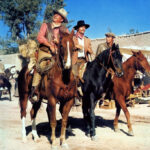John Lupton, an actor known for his genial demeanor and boyish charm, carved out a significant four-decade career in Hollywood. While he may be best recognized as the co-star of the popular western TV series Broken Arrow (1956), Lupton’s consistent presence across stage, film, and television solidified him as a reliable and versatile performer in the entertainment industry.
Born on August 22, 1928, in Highland Park, Illinois, John Lupton was the son of a newspaper writer. His upbringing in Milwaukee nurtured his early interest in acting, sparked by participation in high school theatrical productions. He honed his skills in local stock companies and children’s theater before pursuing formal training at the prestigious American Academy of Dramatic Arts. This foundational experience laid the groundwork for his entry into the professional acting world.
Lupton’s journey in professional theater began with a Broadway debut in a minor role in Mae West’s Diamond Lil (1949). This early exposure on Broadway led to further stage opportunities, including co-starring with Susan Peters in The Glass Menagerie. A pivotal moment came when he joined Katharine Hepburn’s 1950 tour of As You Like It. Hepburn’s mentorship proved instrumental, as she facilitated his introduction to the world of film and Metro-Goldwyn-Mayer (MGM).
During his time as an MGM contract player, John Lupton encountered the typical challenges faced by emerging actors. He was often cast in uncredited roles, such as a spear-carrier in Julius Caesar (1953) and a minor character in Skandal um Patsy (1953). After two years, MGM decided not to renew his contract, prompting Lupton to transition into freelance acting. This shift allowed him to explore a wider range of roles. One of his more notable early film appearances was in Urlaub bis zum Wecken (1955), supporting Tab Hunter. In this war drama, Lupton portrayed a young soldier tragically killed in action shortly after discovering the infidelity of his girlfriend, played by Anne Francis.
In the latter half of the 1950s, John Lupton became a familiar face in action and western films. He took on roles that often depicted him as a rookie or a fresh-faced character in films like In geheimer Mission (1956), Drango (1957), Taming Sutton’s Gal (1957), Faust des Satans (1958), and Das tödliche Netz (1959). Venturing into the horror genre, Lupton notably played the infamous outlaw in the cult classic Jesse James Meets Frankenstein’s Daughter (1966), showcasing his versatility across different film types.
Alongside his film work, John Lupton consistently engaged in television, securing roles in prominent dramatic anthology series such as Robert Montgomery Presents (1950), Playhouse 90 (1956), and Studio One (1948). This diverse experience culminated in his co-starring role in Broken Arrow. In this series, John Lupton portrayed Tom Jeffords, a government agent committed to fostering peace between white settlers and the Apache people, led by their chief Cochise, played by Michael Ansara. The series, inspired by the 1950 film starring James Stewart, brought Lupton significant recognition.
John Lupton’s career momentum extended into the following decades, largely due to his long-term role as Tommy Horton in the daytime soap opera Days of Our Lives (1965). This role provided stability and broadened his audience. Concurrently, he remained active in commercials and made-for-TV movies, and made guest appearances on a variety of popular television shows, including Wagon Train (1957), Gomer Pyle: USMC (1964), The F.B.I. (1965), Ironside (1967), Kung Fu (1972), Cannon (1971), Harry-O (1973), Charlie’s Angels (1976), The Rockford Files (1974), and B.J. and the Bear (1978).
Lupton experienced personal transitions alongside his professional life. His first marriage, which resulted in a daughter, ended in divorce. He later married Dian Friml, granddaughter of composer Rudolf Friml, known for The Vagabond King. Their marriage lasted until his passing. As acting roles became less frequent in the 1980s, John Lupton transitioned to full-time employment in the computer industry, while still occasionally taking on guest roles. He also dedicated time to volunteer work with organizations such as the Multiple Sclerosis Association and Special Olympics.
John Lupton’s final film appearance was in Body Shot (1994), released in the year of his death. He passed away on November 3, 1993, at the age of 65, from undisclosed causes. His wife, Dian, passed away in 2005. While John Lupton may not have achieved top-tier stardom, his enduring career and consistent performances in a wide array of roles cemented his place as a respected and reliable figure in film and television history, particularly remembered for his contributions to classic westerns and daytime drama.

